Ceremony celebrates body donors’ ‘remarkable gift’
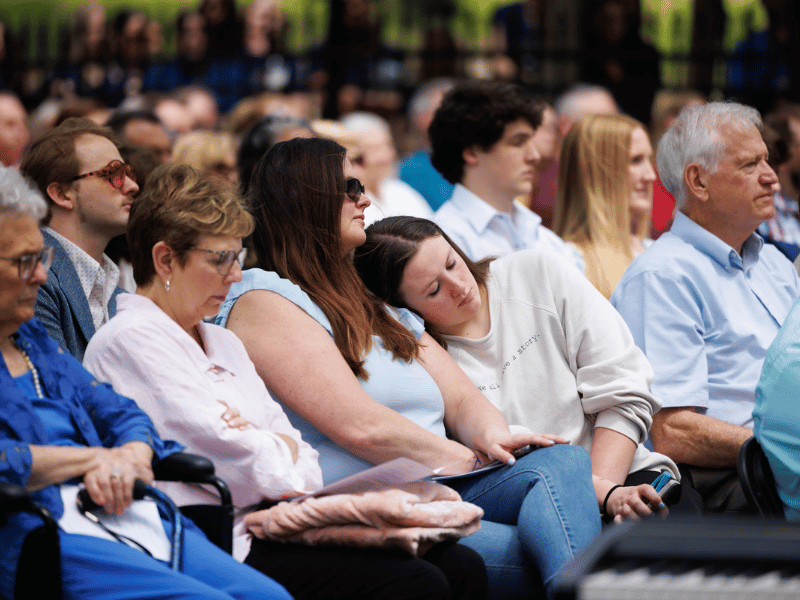
Ray Keith of Clarksdale, a retired postal service worker, wanted to make life better for others, and, now, long after his death, he is still delivering.
On Wednesday, Keith’s name was read aloud during the “Roll Call of Heroes” at the University of Mississippi Medical Center Cemetery as one of more than 100 people honored at A Ceremony of Thanksgiving in Memory of Anatomical Donors.
As the Rev. Dr. Martin Todd Allen, UMMC hospital chaplain, said of Keith and all those who have donated their bodies to science: “It’s quite a miracle to do a good deed after you die.”
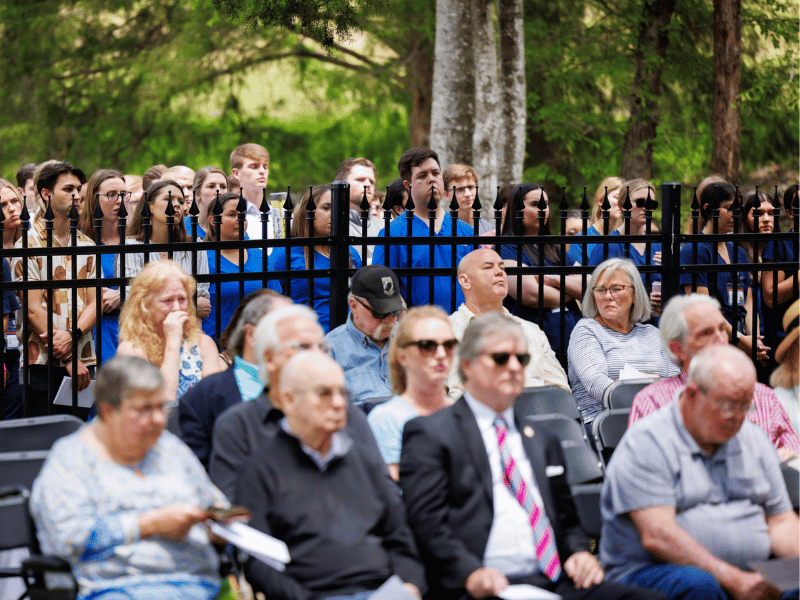
Scores of people from across Mississippi and beyond gathered under the cemetery’s trees to celebrate the legacy of their loved ones. UMMC students declared the debt they owed to their “first patients” – from whom they learned the intricate workings of the human body, but whose names they never knew. Their loved ones were acknowledged, too.
“We are especially pleased to have some of the families with us today,” said Dr. LouAnn Woodward, who welcomed those attending.
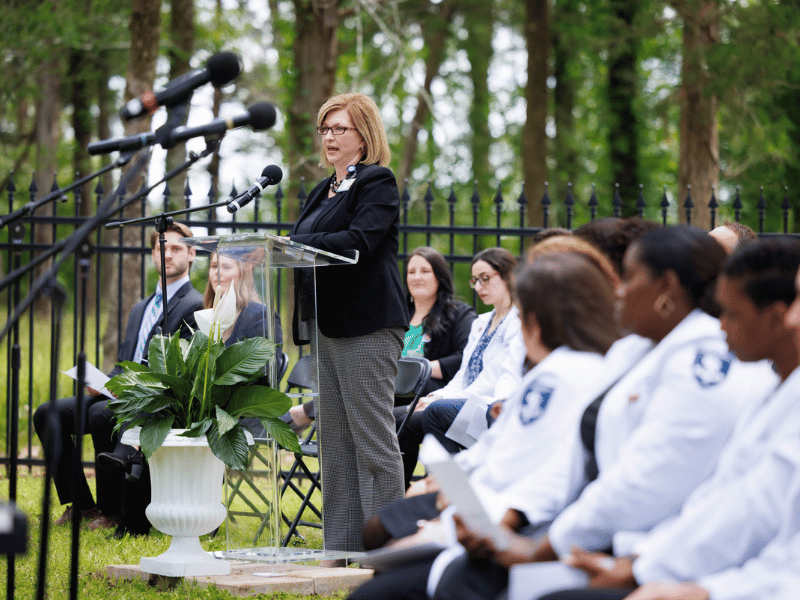
“While we acknowledge the unselfishness of the donor, we also recognize that this decision is not always an easy one for surviving family members,” said Woodward, vice chancellor for health affairs and dean of the School of Medicine at UMMC.
“And we thank them for carrying out the wishes of the donor in spite of their great sense of loss.”
The average age of those who become anatomical donors is 80 to 85, said Dr. Yuefeng “Jordan” Lu, associate professor of advanced biomedical education at UMMC.
Their remains are either returned to the family or buried in the cemetery, where a monument has been placed in their memory.
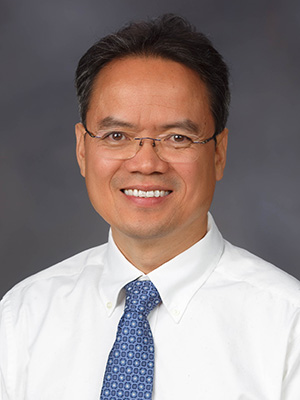
The average number of body donation calls each year is 200 to 250, but about half of those offers have to be declined because of medical conditions or other circumstances, such as recent surgery, Lu said. There are also are weight and height restrictions.
“There is still a big need for donors,” Lu said.
Those who have helped meet that need were recognized during Wednesday’s roll call. Dr. Nathan Tullos, associate professor of advanced biomedical education introduced the students who read the donors’ names: Anaston Hearn, occupational therapy, School of Health Related Professions; Emily Duke, physical therapy, SHRP; Hunter Holley, School of Dentistry; Chloe Elizabeth Coulter, School of Medicine; Dr. Oheneba Boadum, clinical anatomy, School of Graduate Studies in the Health Sciences; and Joshua Lewis, biomedical sciences, SGSHS.
Ray Keith, whose name fell somewhere in the middle, loved giving others – and himself – a lift.
“He built his own plane and flew it,” said his granddaughter, Kristen Locke of Southaven. “And he enjoyed fixing things. When something broke, everyone came to him. Everyone loved him.”
Years before his death, at age 94, Keith had stated his wish to become a body donor, said his daughter, Donna Davenport. “He bragged on it a long time. He was so excited to be able to give to the students.”
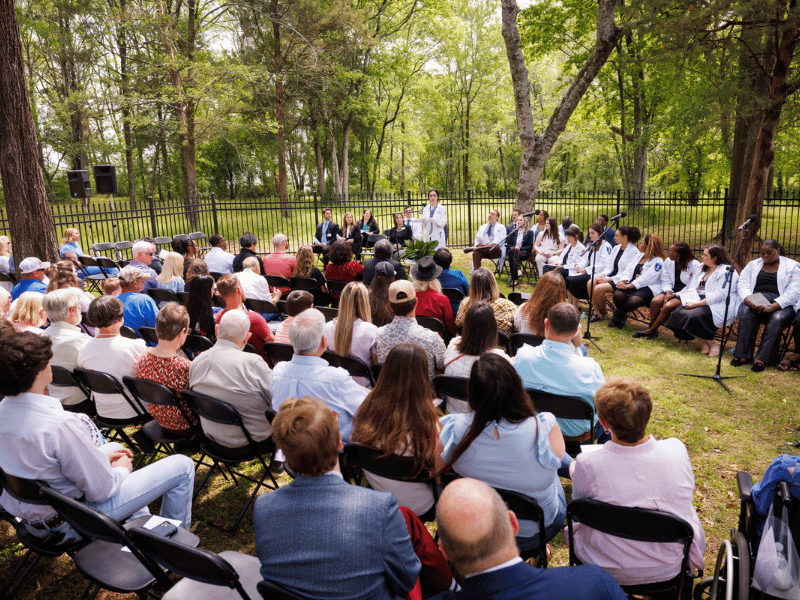
Six students benefitting from gifts like Keith’s described what the donors and their decision mean to them:
- “Your loved ones … have not only shaped our journey as occupational therapy students, but have also sincerely impacted the lives of countless individuals we will serve in our careers … . Our futures as occupational therapists have forever been inspired.”– Laken Milner, OT, School of Health Related Professions
- “While we do not share the personal memory of your loved ones, we will forever remember and appreciate their gift of self … . Even though we have never had the chance to meet each and every donor, their legacy in our lives has prepared us for our chosen profession … . The donors have allowed us as students to nurture our dreams and aspirations to become health care professionals.” – Matthew Matheny, physical therapy, SHRP
- “Your loved one has changed us for the better – and for that, we will always be grateful. I hope you can take pride in knowing your family members are heroes. I hope you can find peace in knowing we treated them as one of our own.” – Davis Helton, School of Dentistry
- “They were our first patients, and as such, they symbolize a selfless gift that will shape the future of medicine, leaving a legacy of healing for generations to come. … The decision to donate a loved one’s body to medical education is one of immense significance, driven by a desire to make a difference in the lives of others. … Let us embrace the knowledge gained and the future lives saved because of their remarkable gift.” – Alex Facundus, School of Medicine
- “They have taught us much more than anatomy, much more than the masterpiece that we call the human body. They have taught us to be curious, to be observant, to be professional. Most of all, they taught us what humanity is all about: sacrifice and continuity.” — Mais Abdelhaq, clinical anatomy, School of Graduate Studies in the Health Sciences
- “‘By their extraordinary gifts/ These dead have taught the living how to touch./ Through them, we touch the body of the world.’” – Jacey Eldridge, biomedical sciences, SGSHS, reading from the poem, “Elegy and Affirmation” by John Stone

Andrea Bessonette drove from her home in Oak Vale in Lawrence County to hear those words spoken about her mother, Miriam Williamson, who retired from a career in banking and finance but never from her passion: baking for others, for most of her 69 years.
“She loved feeding people,” Bessonette said. “I could never lose weight.
“She also loved laying on the creek bank. And playing the organ – she played for her church in Oak Vale for as long as I can remember, and I’m 42.”
Miriam Williamson donated her body, said her daughter, “because she didn’t need it anymore. That’s what she said – that once she was gone, maybe someone else could use it. She wanted somebody to get something good out of it.”
The Ceremony of Thanksgiving was “amazing,” Bessonette said. “It’s very thoughtful. It’s honoring her. It’s a final goodbye.”
Concluding the service was a rendition of the hymn, “Amazing Grace,” by medical students Jasmine Calisette, Micah Diener, Madison Hansen, Meredith Johnson, Robert Lawson, Mia McFadden, Dee Rhymes, Samantha Sherman, Micaela Shields, Meg Walker and Amber N. White
The service provided “closure,” said George Jones of Mendenhall, whose father, Fordie Jones died last fall, about a month before his 70th birthday.
A truck driver who liked to fish and hunt and read Westerns, Fordie Jones “thought that if someone could use his body, if he could help someone, or help cure somebody, that’s what he wanted to do,” his son said.
“Everybody has their own reasons for why they donated. The world is bad enough as it is; if we can learn something from each other to make it a better place, that’s what we should do.”
To view a video of the ceremony, go here. For more information about, or to register in, the Body Donation Program, go here.


